celebrity radar - gossips
We’ll raise one million baseball players in the four years – Fingesi
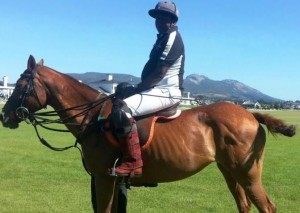
Since the rhythm of sports has centered around soccer, basketball and few not-too-popular others worldwide, the game of polo appeared to be in the background…until now. Features editor, last week discovered the passion and energy driving the game of polo in Nigeria. In this exclusive interview with the President, Nigerian Baseball & Softball Association, Mr. Charles Fingesi reveals the hidden treasure, skill, profitability and global impact among other secrets embedded in this all inclusive game.
Mr. Charles Soala Gbenedior Fingesi is the new President of Nigerian Baseball & Softball Association. Before taking the driving seat of this body, he had been one time president of Port Harcourt Polo Club (PHPC) for three years (2007-2009). In the years between, the Okrika, Rivers state born engineer, technocrat and ‘part time’ politician has been pushing the course of a game acclaimed to be for the rich and accomplished cadre.
He threw some light first into the game of polo which was thought to be unAfrican and not too popular, particularly in Nigeria.
“That was way in the past; things have really changed. Africans are seriously into polo now and the biggest polo country in the Continent is South Africa. Nigeria ranks second in that order.”
What was the focus of his presidency in the polo game and how did he fare?
“I must first point out that polo is an expensive habit; you must first and foremost buy the horses, then you must maintain them; thereafter you will be riding and you start to enjoy them. If you maintain them you enjoy them better, but if you don’t, then you won’t have any excuse…which is why I am not enjoying mine so much.
“Now, when I was president of PHPC, all we did was to take the game to everybody, so to say. We got so many persons around this part of the country to understand what horse riding is all about and got them into the game because that’s what polo game is all about.
“Like we just finished playing a game of polo now; even though I am the president of the Port Harcourt Baseball Association, but I can’t get away from playing polo; the passion is just there and will never go away.”
Born in Okrika town in Okrika Local Government Area of Rivers State, Fingesi currently owns about ten horses and has been active in the last nine months playing polo around the world. He told The Daily Times how he got into the passion in the first place.
“My father was a member of the Port Harcourt Polo Club when I was a kid; we used to visit the club and would watch daddy play and afterwards, we hop on horseback when he would let us. We just ride and….that’s how it started. After a while, the passion went beyond just horse riding and we decided to do polo. I started playing polo about 17 years ago.”
Besides the passion, Fingesi opened up on the elitist and profitability part of the game. Is polo really as profitable as soccer?
“O yes; with polo, you get to meet all the right persons in the world. Polo is the biggest social thing in the world; it attracts very exclusive people. It is an opportunity you can use if you are smart to know good people and when you know good people you do good things too. That is the positive side.”
How does he see the future of polo in Nigeria?
“In Nigeria, Polo had a slight problem, and that problem polo players decided to overcome by allowing two associations to coexist. There is the association called Nigerian Polo Association (NPA) and there’s another called the Nigerian Polo Federation (NPF).
“The rich people in Nigeria who are into the game of polo, own the horses; they own the facilities for polo and they own the clubs; even the grounds and the good horses are owned by members of the NPA.
“But the smaller group players that don’t own horses, that actually were taking care of the owners of horses, decided to create their own association called the NPF, thinking that the Nigerian Sports Commission (NSC) would fund them, but the NSC refused to fund them because polo is an expensive sport in the first place. Then secondly, polo is considered around the world to be for the rich so, why fund the rich when there are other sports associations to fund in the country?
“So that was an error the NPF made, buy now, they are about to come together and play polo as one body. In the next few months or so, polo would be one again in Nigeria, and polo is big time sport here, I tell you.”
Can the same be said of polo in Africa?
“In Africa, the biggest country that plays polo in the Continent is the South Africa where they have a breed of horses that outlive any other horse in Africa in terms of polo. In Nigeria, we play Argentine horses which are imported from Argentina, or we play what we call the Sudanese horses which are also imported from Sudan in North Africa.
“But in South Africa, they play what we call the thoroughbred, and these thoroughbred horses are very good for polo. South Africa is the only country that has a lot of money in polo more than Nigeria, but Nigeria is growing in the game. In Northern Nigeria, polo is big; in Southwest Lagos, polo is big, very big in fact, and polo is developing in the South-East and South-South.”
For a layman, it has always been wondered where skill comes into the game you play on horseback: is it in the horses or on the players?
“The horse represents 70 percent of the game; if you have a horse that acts like a donkey, then you cannot really play polo. If you have a horse that is fast, that can turn left and right and stop when you want it, then that kind of horse can play polo.
“The player or rider, 30 percent of the rest of the work is his, because you must know how to ride well, and you must have the skill of picking up small ball into a big post which may sound very easy, but picking a small ball into a big post when you’re on horseback and running at neck breaking speed, sometimes it is difficult.”
Base Ball, a game of intelligence
Currently the president of the Nigerian Baseball and Softball Association; Fingesi explains the sameness of the games.
“Baseball and Softball can be likened to a man or woman, or the masculine and the feminine because baseball is for the men and softball is for the women.
”I became the president in November 2014; before me was Gen Ishola Williams who was president for the baseball association for some 16 or 17 years. She just decided to retire and I became the next president.”
What do you aim to achieve during your tenure?
“There are thousands of girls in Nigeria that play softball; also there are even more thousands of young men in Nigeria that play baseball; the sports is expanding. It has not made a lot of inroad into Northern Nigeria like it has in Southern Nigeria and that is where my tenure is working at, to make sure that there is baseball in every part of Nigeria because there are hidden talents everywhere in this country.
“Now, besides expanding the sports and creating awareness, baseball and softball around the world is known to be a game for intelligent people; ‘intelligent sports’, it is called. It is a game where you use your brain power to outdo the other team you are playing against and outside that, you require some physical strength too to be able to run, throw ball and to be able to catch ball while you’re running. It requires a lot of intelligence and coordination to play baseball.”
How does that relate with the younger ones?
“Oh, children like it. When you start grooming children from the age where they throw balls while running and you’re scoring them points, they get interested and it doesn’t take too much time to get into the game. Then it helps them in their development: children develop more properly playing baseball or softball.”
What is your dream for the game?
“I can tell you that baseball and softball is one of the most lucrative sports in the world, but hardly in Africa has the game reached where we envisage it to reach because of its funding. It is difficult to fund baseball like it is difficult to fund polo because you require a very large space for baseball just as you require a large space for polo. Now when you say large space, it requires money and I will tell you why:
“Baseball cannot be played in your compound, just as you cannot ride horses inside your compound. Large spaces in the property market does not come cheap, that is why we are out encouraging state and local governments. Our proposal and package is, provide us with the space and we will come teach your people the game of baseball and softball. Happily we are beginning to get responses around the country where even local government areas are contributing land.”
The good thing about land for baseball or softball is that you can do so many other things on it, Fingesi further said. “You can play football, basketball, cricket, etc on it and you can ride your horses. All you need is just an open space; what you do is just mark the field for your bases and you run around from one base to the other.
“Having said that, what we intend to do in Nigeria is to make sure that up to a million children play baseball in the next four years, that is our target.”
Now for the profitability of the game: how do we make good money?
“Baseball is the most lucrative of all sports in the world; players earn more money than footballers and basketballers, etc. Those who have the talent have limitless opportunities.”
Where does the money come from?
“The money comes from sponsorship of baseball; it is one of the games that is most funded in the world. In Asia, the Asian giants all play baseball, China, Japan and Korea all play baseball; they all have baseball parks all around their countries.
“In Nigeria, we have only two baseball parks and that’s not good for the country. We have one in the National stadium in Abuja and another in Ilorin, Kwara State. We are looking at having six baseball parks in the next one year around country; what we are trying to do now is find those who will fund it.
“The minute we succeed, the interest of baseball will keep increasing and by the grace of God we will achieve our ultimate goal of getting a million children to play baseball in the next four years.”
Cost of a baseball park
“It’s one of the cheapest things to fund. Let’s assume that you give us a large piece of bush; what it takes to cut down and remove the trees and shrubs in the bush is what it costs to set up a baseball ground. It becomes a park when you build sitting areas around the ground, but what it costs to flatten the ground after you remove all obstacles besides cutting and removing the trees is all it costs.”
The sport is growing so fast and Fingesi is optimistic that the next generation of Nigerians will rule the world with baseball and softball.
Now, a little of Fingesi’s political personae seeing the volatile state of the polity in Rivers State, is Fingesi involved in politics, by any chance?
“Yes, I would call myself a politician, but I really don’t do active politics because I also work for a multinational company; I however support politics truly.”
He said of his party and the state.
“Rivers state is a PDP state. The ex governor, Amaechi tried to turn the state into an APC state when he crossed to the opposition but they didn’t succeed.
“And this APC thing, we are taking a second look at it – and by that, I mean that for as long as the former governor doesn’t have influence in Rivers state politics again, a lot of people might decide to embrace APC; but because the former governor is still dominating the polity in Rivers state, everybody here remains PDP.”
Why is there so much bloodshed in the state polity? Why should someone die on account of someone else’s political ambition?
“I like that question because it is a touchy one. I will put it this way:
“Rivers is a rich state in terms of revenue it generates and in terms of the subventions that come to the state from the Federal Government.
“And ‘Nigerians’ being what they are, they want to dominate the big funds that come to Rivers state. Now, those who dominate it become influential so, instead of playing the right politics and win election fairly, they’ve gone beyond that to carry the gun to forcefully win elections.
“This started in 1999; the election that brought Peter Odili to power was violent and thereafter till today, it has never been without violence: it just gets worse every time there’s an election, like what we are witnessing now.”
Source: Daily Times
celebrity radar - gossips
Another Feather for Nollywood Icon Fidelis Duker
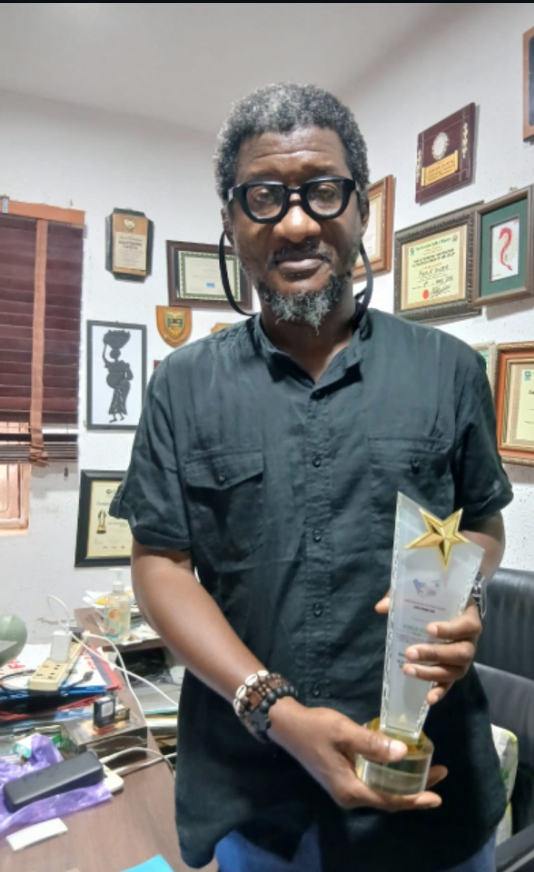
**Another Feather for Nollywood Icon Fidelis Duker
*Lagos, Nigeria* — In a remarkable celebration of artistic achievement, renowned Nollywood figure Fidelis Duker received yet another prestigious accolade last weekend, solidifying his role as a key player in the growth of the Nigerian and African film industries. The award was presented in a ceremony held at Duker’s Lagos office by esteemed film and theatre director, Mr. Alex Eyengho, founder of the Warri International Film Festival, alongside Marketing and Strategy Director, Mrs. Matel Eyengho.
The recent recognition builds upon Duker’s previous achievement at last year’s ECOFEST in Dakar, where he was honored with a Lifetime Achievement Award. This latest accolade is a testament to his unwavering dedication and substantial contributions to the cinematic landscape.
“I am truly humbled by this recognition,” Duker expressed during the event. In his speech, Alex Eyengho lauded Duker’s pioneering efforts in establishing significant film festivals in Nigeria, particularly the Abuja International Film Festival, which has played a vital role in promoting local talent and storytelling.
Eyengho emphasized, “Fidelis has not only paved the way for emerging filmmakers but has also helped elevate Nigerian cinema on the global stage. His creative vision and commitment inspire all of us in the industry.”
As Duker reflects on this honor, he acknowledges the importance of teamwork and collaboration in achieving success. “This acknowledgment reaffirms to my team and me that our work is being observed, and it motivates us to continue contributing to the development of our sector,” he stated.
With numerous projects on the horizon, Duker remains a relentless advocate for the growth and recognition of African cinema. His latest recognition is yet another testament to the vibrant and evolving landscape of Nollywood, as industry leaders like him continue to inspire future generations.
As the film industry anticipates the next phase of development, Duker’s continued influence signals a promising future for filmmakers in Nigeria and across the continent.
celebrity radar - gossips
E‑Money’s Grand Gesture: A Closer Look at the SUV Gift to Chinedu “Aki” Ikedieze

E‑Money’s Grand Gesture: A Closer Look at the SUV Gift to Chinedu “Aki” Ikedieze
By George Omagbemi Sylvester | Published by SaharaWeeklyNG
“Public Generosity, Celebrity Loyalty and the Symbolism of Wealth in Nigeria’s Entertainment Elite.”
On Tuesday, February 17, 2026, Nigerian billionaire and entrepreneur Emeka Okonkwo, widely known as E‑Money, once again captured national attention with a lavish and highly publicised act of generosity, gifting a brand‑new 2024/2025 Ford SUV to veteran Nollywood actor Chinedu Ikedieze, affectionately called Aki, during his high‑profile birthday celebration.
The event, held in Lagos amidst a constellation of entertainers, business figures and socialites, was itself part of an annual tradition in which E‑Money marks his birthday (on February 18) with large‑scale giveaways and spectacular shows of material philanthropy. This year, he announced the gift of over 30 cars to friends, staff and family, a gesture that quickly went viral as videos and images circulated across social media platforms.
In the case of Ikedieze, E‑Money’s gift appeared to be deeply personal. During the festivities, E‑Money stood beside his elder brother, Grammy‑nominated musician KCee and recounted how Ikedieze stood by him at his 2007 wedding. The billionaire explained that the SUV was a “token of appreciation” for the enduring support the actor had shown over the years which is a narrative that blends friendship with public celebration.
Ikedieze, a Nollywood staple with a career spanning more than two decades and over 150 film credits, including the iconic Aki na Ukwa franchise, visibly reacted with humble surprise as he received the vehicle, bowing his head in respect and gratitude. The actor later shared the moment on his Instagram account with a caption celebrating the gift, further fuelling online engagement around the event.
Beyond the spectacle, this incident underscores evolving dynamics in Nigerian celebrity culture and the intersection of wealth, influence and reciprocity. Sociologist Dr. Chinedum Uche of the University of Lagos, speaking on the broader implications of such high‑profile gifts, notes: “Philanthropy that is highly publicised can reinforce social bonds, but it also reflects a culture where generosity is intertwined with reputation economy; where giving becomes as much a social signal as it is an act of kindness.” The quote highlights how public acts of wealth transfer among elites serve layered social functions that extend beyond pure altruism.
Critics of such displays argue that ostentatious giveaways, particularly in a country with stark economic disparities, risk amplifying social envy and exacerbating perceptions of inequality. Economist Dr. Ifunanya Nwosu from the Lagos Business School observes: “In societies marked by economic stratification, celebrity largesse may inspire admiration, but it can also inadvertently highlight structural inequities; prompting questions about systemic investment in public welfare versus individual generosity.”
Still, supporters maintain that E‑Money’s annual tradition (which has in past years included cash gifts to his brother KCee, comedians and even domestic staff) reflects genuine gratitude and a commitment to uplifting his immediate circle, albeit within the private sphere.
For Ikedieze, the SUV stands both as a heartfelt gesture from a longtime friend and a public affirmation of their enduring relationship. As the video of the moment continues to circulate, the broader narrative has ignited discussions about the role of private wealth in public life, celebrity culture and how acts of giving are interpreted in contemporary Nigerian society.
In a landscape where influence and generosity often play out in equal measure on public stages, E‑Money’s gift to Aki is more than a headline, it is a flashpoint in ongoing debates about wealth, friendship and visibility in Nigeria’s entertainment and entrepreneurial ecosystem.
celebrity radar - gossips
Spiritual Reality: Wicked People Are Possessed by Wicked Spirits — Dr. Christian Okafor
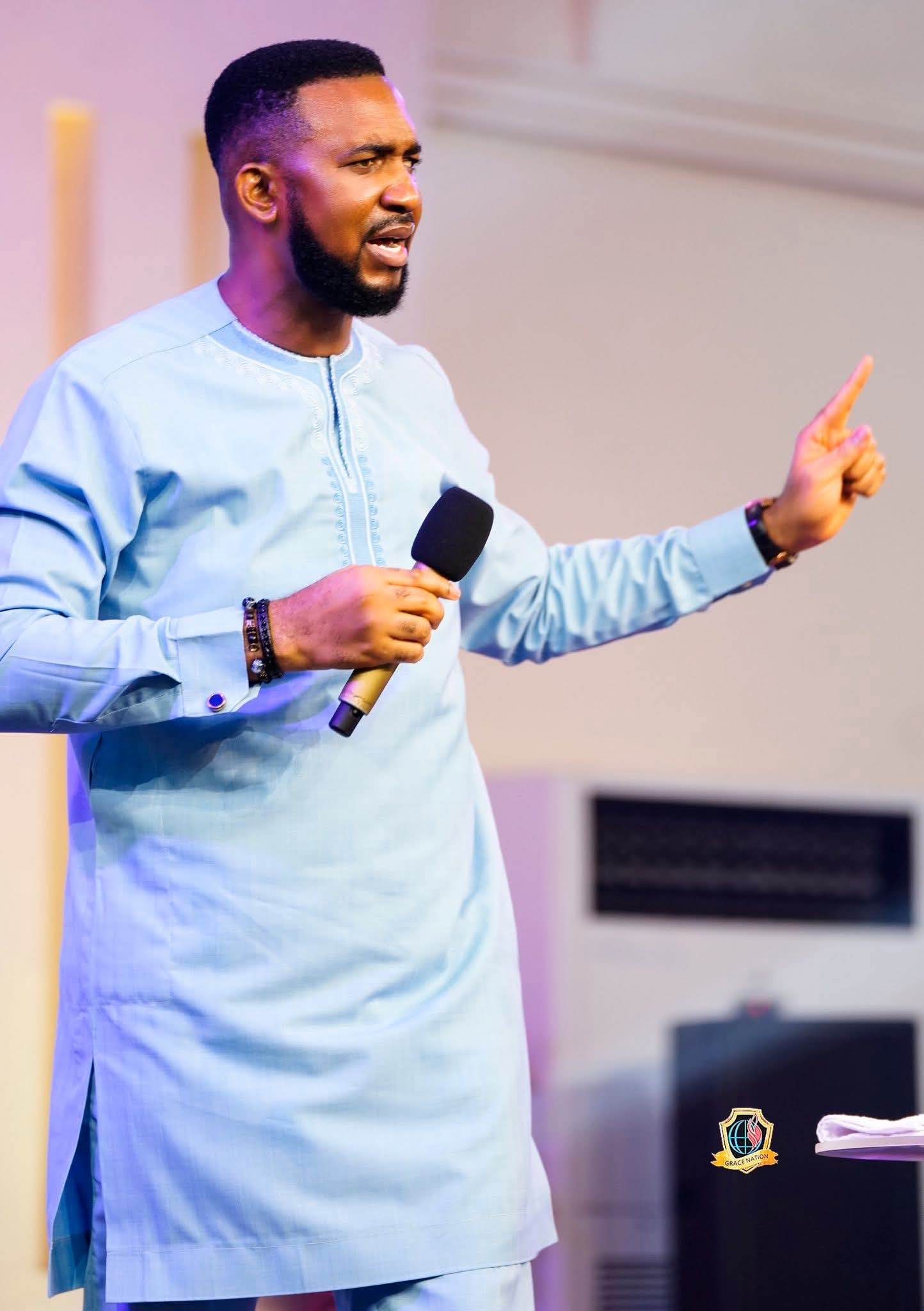
Spiritual Reality: Wicked People Are
Possessed by Wicked Spirits — Dr. Christian Okafor
…..“You don’t need to offend them before they attack you.”
…..“Your only true help comes from God.”
Demons are strategic and calculating. They detect threats quickly and position themselves to resist any power that may expose or overpower them.
According to the Generational Prophet and Senior Pastor of Grace Nation Global, Christian Okafor, spiritual intelligence operates both in light and in darkness—and believers must understand this reality.
Dr. Okafor delivered this message on Thursday, February 19, 2026, during the midweek Prophetic, Healing, Deliverance and Solutions Service (PHDS) held at the international headquarters of Grace Nation Worldwide in Ojodu Berger, Lagos, Nigeria.
The Operations of Demons
Teaching on the subject “Spiritual Reality” with the subtitle “Operations of Demons,” the Man of God explained that when demons possess individuals, their behavior changes. Such people may attack, bully, or resist those sent by God to help them, unknowingly rejecting divine assistance and prolonging their struggles.
“You don’t need to offend a demon before it attacks you,” he said. “What you carry is enough to provoke opposition. The greater your potential, the greater the battle.”
Dr. Okafor noted that many believers misinterpret battles as signs that God has abandoned them. However, he explained that some battles are permitted for growth, training, and divine glorification.
According to him, God may allow certain confrontations so that believers understand spiritual warfare and emerge stronger.
“Some battles are necessary,” he emphasized. “They push you into your turning point.”
He further stated that God does not respond to lies, blackmail, or bullying. He responds to His Word. Therefore, opposition is not proof of God’s absence, but often evidence of destiny at work.
The Weapon Against Demonic Attacks
Addressing solutions, Dr. Okafor described prayer as the strongest weapon against satanic operations.
“Prayer is the license that invites God into your battles,” he declared. “God does not intrude—He responds to invitation.”
According to the Apostle of Altars, understanding the principles and discipline of prayer enables believers to receive divine strategies for overcoming demonic resistance. Without prayer, he warned, spiritual help cannot be activated.
“You cannot receive help without God,” he concluded. “And you cannot engage God without prayer.”
Manifestations at the Service
The midweek gathering was marked by a strong move of the Spirit, with testimonies of deliverance, miracles, restoration, and solutions to various challenges presented before God. Several individuals reportedly committed their lives to Christ during the service.
-

 celebrity radar - gossips6 months ago
celebrity radar - gossips6 months agoWhy Babangida’s Hilltop Home Became Nigeria’s Political “Mecca”
-

 society6 months ago
society6 months agoPower is a Loan, Not a Possession: The Sacred Duty of Planting People
-

 society5 months ago
society5 months agoReligion: Africa’s Oldest Weapon of Enslavement and the Forgotten Truth
-

 news6 months ago
news6 months agoTHE APPOINTMENT OF WASIU AYINDE BY THE FEDERAL GOVERNMENT AS AN AMBASSADOR SOUNDS EMBARRASSING



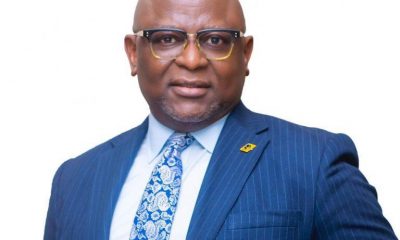

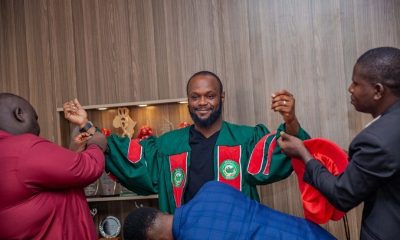



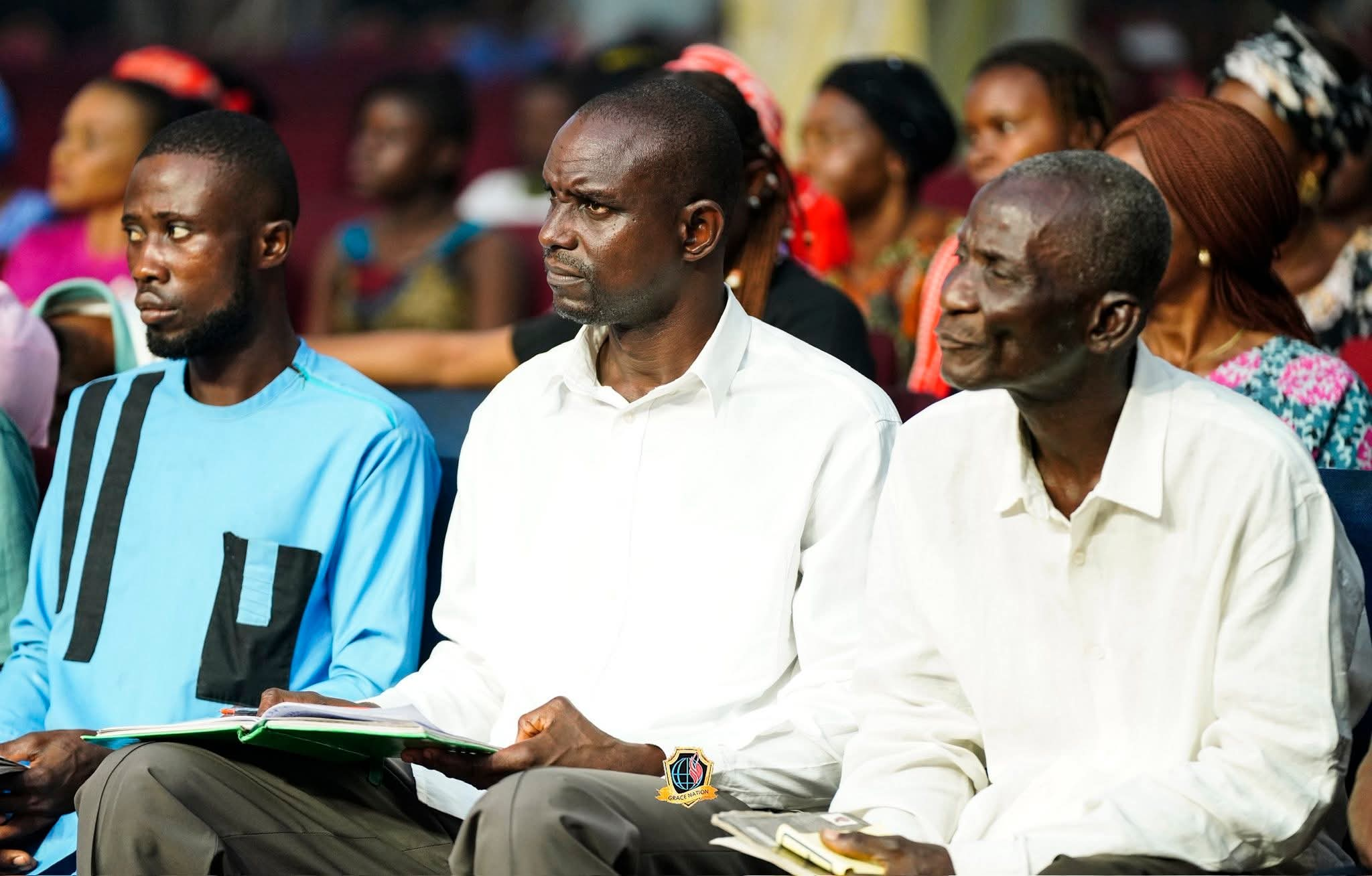

You must be logged in to post a comment Login